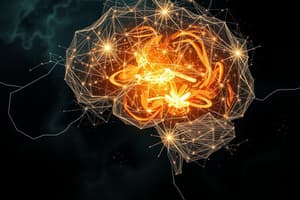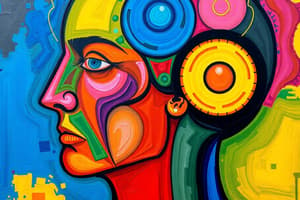Podcast
Questions and Answers
What did Pythagoras believe was the highest purpose in life?
What did Pythagoras believe was the highest purpose in life?
- Pursuit of knowledge and understanding (correct)
- Physical strength
- Wealth acquisition
- Political power
Pythagoras is best known for his work in philosophy rather than mathematics.
Pythagoras is best known for his work in philosophy rather than mathematics.
False (B)
What term did Pythagoras use to describe himself?
What term did Pythagoras use to describe himself?
lover of wisdom
The philosophical tradition that originated in the ancient world is known as ________ philosophy.
The philosophical tradition that originated in the ancient world is known as ________ philosophy.
Which of the following concepts is associated with Pythagorean philosophy?
Which of the following concepts is associated with Pythagorean philosophy?
The Golden Age of Greek philosophy primarily took place in Sparta.
The Golden Age of Greek philosophy primarily took place in Sparta.
Match the following philosophers or concepts with their contributions:
Match the following philosophers or concepts with their contributions:
What was the focus of philosophers during the Golden Age of Greek philosophy?
What was the focus of philosophers during the Golden Age of Greek philosophy?
Who is regarded as the first philosopher in Western history?
Who is regarded as the first philosopher in Western history?
Thales believed that air was the fundamental substance of the universe.
Thales believed that air was the fundamental substance of the universe.
What does the term 'philosophy' etymologically mean?
What does the term 'philosophy' etymologically mean?
What period does modern philosophy encompass?
What period does modern philosophy encompass?
The modern philosophical era was marked by the Catholic Church gaining more power in Europe.
The modern philosophical era was marked by the Catholic Church gaining more power in Europe.
Philosophy deals with the study of beings in their ultimate causes, reasons, and principles through the aid of _____ alone.
Philosophy deals with the study of beings in their ultimate causes, reasons, and principles through the aid of _____ alone.
Who is often referred to as the 'Father of Modern Philosophy'?
Who is often referred to as the 'Father of Modern Philosophy'?
Match the following philosophers with their contributions:
Match the following philosophers with their contributions:
Which of the following concepts is NOT typically studied in philosophy?
Which of the following concepts is NOT typically studied in philosophy?
John Locke is known for his theory of the mind and the concept of the blank slate, or _______.
John Locke is known for his theory of the mind and the concept of the blank slate, or _______.
Match the philosopher to their contribution:
Match the philosopher to their contribution:
Philosophy only studies material beings.
Philosophy only studies material beings.
What marked the shift from mythological explanations to rational explanations in philosophy?
What marked the shift from mythological explanations to rational explanations in philosophy?
What is the main focus of epistemology in modern philosophy?
What is the main focus of epistemology in modern philosophy?
Immanuel Kant's 'Critique of Pure Reason' sought to reconcile rationalism and empiricism.
Immanuel Kant's 'Critique of Pure Reason' sought to reconcile rationalism and empiricism.
Which concept introduced by Kant is significant in ethics?
Which concept introduced by Kant is significant in ethics?
Flashcards are hidden until you start studying
Study Notes
Introduction to Philosophy
- Philosophy examines fundamental questions regarding existence, knowledge, values, and reality.
- Engages critical thinking on life’s big questions, such as the purpose of life and moral reasoning.
Origins of Western Philosophy
- Originated in ancient Greece, marking a shift from mythological to rational explanations of the universe.
- Thales of Miletus (624-546 BCE): First philosopher, considered water as the fundamental substance of all things, promoting natural and logical understanding.
Definition of Philosophy
- Etymologically derived from Greek "philosophia," meaning "love of wisdom."
- Scientifically defined as the study of beings and their ultimate causes and principles through human reason.
- Distinction between material beings (tangible, e.g., objects) and immaterial beings (intangible, e.g., concepts like love and beauty).
Pythagoras
- Lived around 570-495 BCE; known for the Pythagorean theorem.
- First to call himself “lover of wisdom”; emphasized rational thought and ethical living.
- Beliefs included the immortality of the soul and the mathematical nature of reality.
- Founded Pythagoreanism, promoting self-discipline and spiritual purity.
Historical Progression of Philosophy
- Ancient Philosophy: Flourished in the 5th century BC, particularly in Athens, with a focus on cosmocentricity—what constitutes the cosmos.
Modern Philosophy
- Spanning the Renaissance (16th century) to the 19th century, responding to the scientific revolution and socio-political changes.
- Characterized by the decline of the Catholic Church's influence on intellectual life in Europe.
Key Philosopher Contributions
-
René Descartes (1596-1650): Known as the "Father of Modern Philosophy." Introduced the method of doubt and the principle "Cogito, ergo sum." His work laid the groundwork for modern epistemology.
-
John Locke (1632-1704): A central figure in empiricism, arguing knowledge arises from sensory experience. Introduced the concept of the "tabula rasa," shaping modern political philosophy and liberal democracy.
-
Immanuel Kant (1724-1804): Sought to reconcile rationalism and empiricism. His "Critique of Pure Reason" explored human understanding limits and introduced the "categorical imperative" in ethics, significantly influencing metaphysics and epistemology.
Conclusion
- Philosophy serves as a critical discipline that spans both ancient and modern times, continuously evolving in response to new discoveries and societal changes.
Studying That Suits You
Use AI to generate personalized quizzes and flashcards to suit your learning preferences.




